The AMD Ryzen 3 1300X and Ryzen 3 1200 CPU Review: Zen on a Budget
by Ian Cutress on July 27, 2017 9:30 AM EST- Posted in
- CPUs
- AMD
- Zen
- Ryzen
- Ryzen 3
- Ryzen 3 1300X
- Ryzen 3 1200
Benchmarking Performance: CPU Legacy Tests
Our legacy tests represent benchmarks that were once at the height of their time. Some of these are industry standard synthetics, and we have data going back over 10 years. All of the data here has been rerun on Windows 10, and we plan to go back several generations of components to see how performance has evolved.
All of our benchmark results can also be found in our benchmark engine, Bench.
3D Particle Movement v1
3DPM is a self-penned benchmark, taking basic 3D movement algorithms used in Brownian Motion simulations and testing them for speed. High floating point performance, MHz and IPC wins in the single thread version, whereas the multithread version has to handle the threads and loves more cores. This is the original version, written in the style of a typical non-computer science student coding up an algorithm for their theoretical problem, and comes without any non-obvious optimizations not already performed by the compiler, such as false sharing.
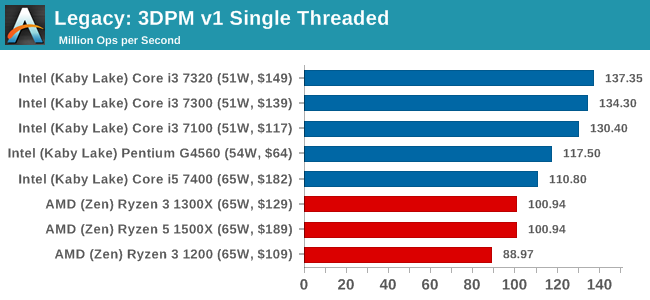
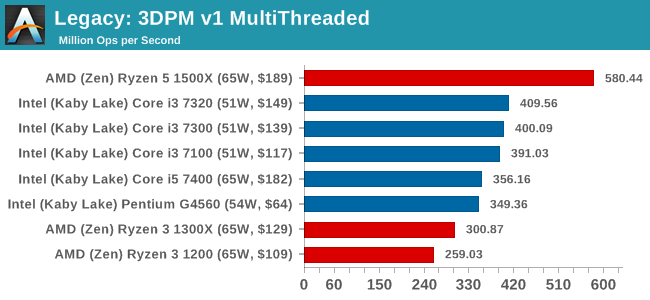
CineBench 11.5 and 10
Cinebench is a widely known benchmarking tool for measuring performance relative to MAXON's animation software Cinema 4D. Cinebench has been optimized over a decade and focuses on purely CPU horsepower, meaning if there is a discrepancy in pure throughput characteristics, Cinebench is likely to show that discrepancy. Arguably other software doesn't make use of all the tools available, so the real world relevance might purely be academic, but given our large database of data for Cinebench it seems difficult to ignore a small five-minute test. We run the modern version 15 in this test, as well as the older 11.5 and 10 due to our back data.
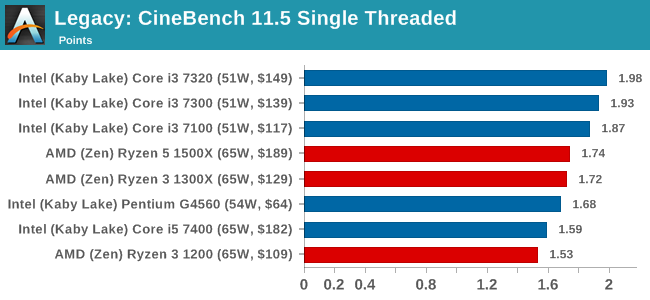
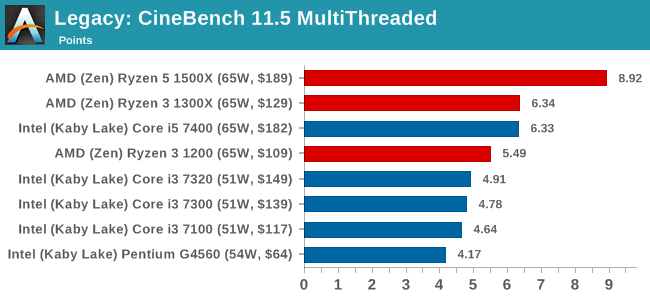
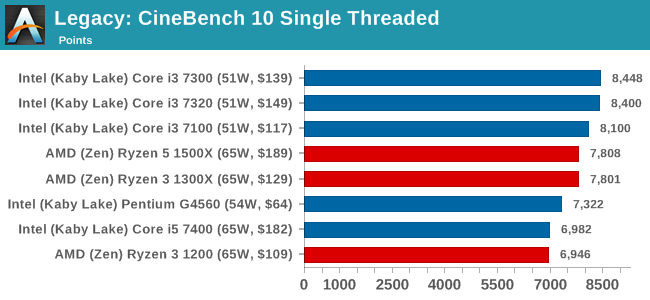
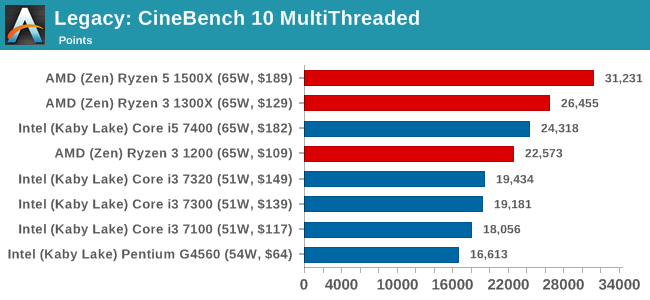
x264 HD 3.0
Similarly, the x264 HD 3.0 package we use here is also kept for historic regressional data. The latest version is 5.0.1, and encodes a 1080p video clip into a high-quality x264 file. Version 3.0 only performs the same test on a 720p file, and in most circumstances the software performance hits its limit on high-end processors, but still works well for mainstream and low-end. Also, this version only takes a few minutes, whereas the latest can take over 90 minutes to run.
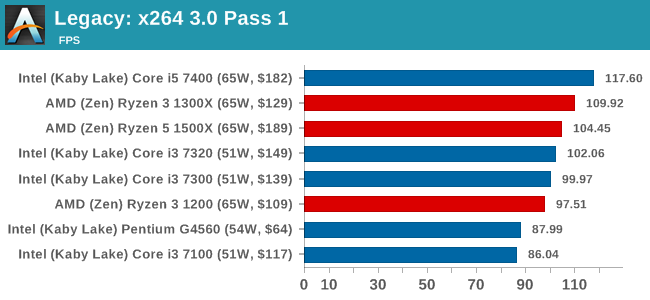
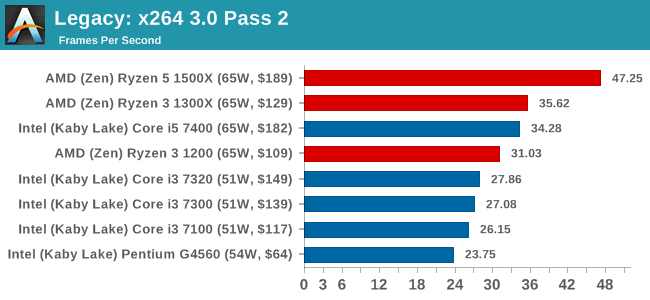










140 Comments
View All Comments
Oxford Guy - Thursday, July 27, 2017 - link
"The Ryzen 3 1200 brings up the rear of the stack, being the lowest CPU in the stack, having the lowest frequency at 3.1G base, 3.4G turbo, 3.1G all-core turbo, no hyperthreading and the lowest amount of L3 cache."That bit about the L3 is incorrect unless the chart on page 1 is incorrect. It shows the same L3 size for 1400, 1300X, and 1200.
Oxford Guy - Thursday, July 27, 2017 - link
And this:"Number 3 leads to a lop-sided silicon die, and obviously wasn’t chosen."
Obviously?
Oxford Guy - Thursday, July 27, 2017 - link
"DDR4-2400 C15"2400, really — even though it is, obviously, known that Zen needs faster RAM to perform efficiently?
Joel Hruska managed to test Ryzen with 3200 speed RAM on his day 1 review. I bought 16 GB of 3200 RAM from Microcenter last Christmastime for $80. Just because RAM prices are nuts right now doesn't mean we should gut Ryzen's performance by sticking it with low-speed RAM.
Oxford Guy - Thursday, July 27, 2017 - link
"This is also typically run at JEDEC subtimings where possible. It is noted that some users are not keen on this policy"Maybe you guys should rethink your logic.
1) You have claimed, when overclocking, that it's not necessary to do full stability testing, like with Prime. Just passing some lower-grade stress testing is enough to make an overclock "stable enough".
2) Your overclocking reviews have pushed unwise levels of voltage into CPUs to go along with this "stable enough" overclock.
So... you argue against proof of true stability, both in the final overclock settings being satisfactorily tested and in safe voltages being decided upon.
And — simultaneously — kneecap Zen processors by using silly JEDEC standards, trying to look conservative?
Please.
Everyone knows the JEDEC standard applies to enterprise. Patriot is just one manufacturer of RAM that tested and certified far better RAM performance on B350 and A320 Zen boards. You had that very article on your site just a short time ago.
Your logic doesn't add up. It is not a significant enough cost savings for system builders to go with slow RAM for Zen. The only argument you can use, at all, is that OEMs are likely to kneecap Zen with slow RAM. That is not a given, though. OEMs can use faster RAM, like, at least, 2666, if they choose to. If they're marketing toward gamers they likely will.
Oxford Guy - Thursday, July 27, 2017 - link
"Truth be told I never actually played the first version, but every edition from the second to the sixth, including the fifth as voiced by the late Leonard Nimoy"You mean Civ IV.
Oxford Guy - Thursday, July 27, 2017 - link
And, yeah, we can afford to test with an Nvidia 1080 but we can't afford to use decent speed RAM.Yeah... makes sense.
Hixbot - Thursday, July 27, 2017 - link
Are you having a conversation with yourself? Try to condense your points into a single post.Oxford Guy - Friday, July 28, 2017 - link
I don't live in a static universe where all of the things I'm capable of thinking of are immediately apparent, but thanks for the whine.Manch - Friday, July 28, 2017 - link
Really snowflake? You're saying he is whining? How many rants have you posted? LOL The difference between 2400 and 3200 shows up more on the higher end processors bc bigger L3 & HT err SMT. The diff in CPU bound gaming is 5-10% at most with the Ryzen 7's. Smaller with the 5's. Even more so with the 3's. Small enough to the point that it would not change the outlook on the CPU's. Also consider that if Ian change the parameters of his test constantly it would also skew numbers more so and render bench unreliable. Test the Ryzen 7's with 2133 then the 5's with 2400 then the 3's with 3200? Obviously anandtechs test are not the definitive performance bench mark for the world. What it is, is a reliably consistent benchmark allowing you to compare diff cpus with as little changed as possible as too not skew performance. Think EPA gas mileage stickers on cars. Will you get that rating? maybe. What it does is it gives you comparative results. From there its fairly easy to extrapolate the difference. Now I'm sure they will as they have in the past update there baseline specs for testing. You're running off the rails about how much the memory effects are. Look at all the youtube vids and other reviews out there. Difference yes. A lot? meh I also believe anandtech has mentioned doing a write up on the latest agesa update since its had a significant impact(including memory) on the series.Oxford Guy - Friday, July 28, 2017 - link
"You're saying he is whining? How many rants have you posted?"Pot kettle fallacy.